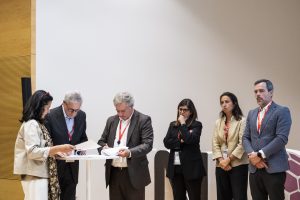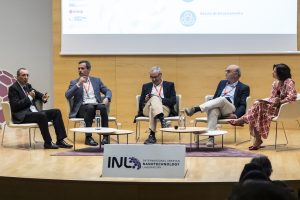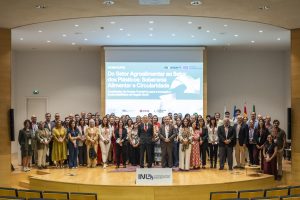Article written by Raquel de Sousa and Ana Amado (INL)
Braga, October 14, 2025 — the Commission for Coordination and Regional Development of the North (CCDR-NORTE) hosted the final seminar of the FRONTSH1P project at the INL – International Iberian Nanotechnology Laboratory. The event “From the Agri-food Sector to the Plastics Sector: Food Sovereignty and Circularity”, marked a key moment in the region’s green transition journey and awareness, focusing on decarbonization through replicable systemic circular models. It brought together representatives from Public Institutions (20%), Businesses (22%), Research Institutions (41%), Professional Associations (9%) and civil society (8%). Discussions centered on the FRONTSH1P project’s contributions to territorial sustainability and regeneration actions for the agri-food, feed, plastics, and rubber value chains. We had a special contribution from our FRONTsh1p partners from LNEG – The National Laboratory of Energy and Geology, who have been creating innovative technical solutions using microalgae for water effluent treatment (CSS3 – Water and Nutrients).
The Norte Region presented two action plans and a roadmap to accelerate circular economy transition:
🌱 The Action Plan for the Agri-food sector (CSS2), presented by Teresa Carvalho (PortugalFoods) focused on five strategic axis such as 1) Sustainable and Localised Food Systems, 2) Sustainable and Regenerative Agri-Food Production and 3) Capacity Building, Innovation, and Circular Food Citizenship
♻️ As for the Plastics and Rubber sector (CSS4), Catarina Gonçalves (ASWP) emphasised 1) Regulatory simplification and legal support for companies, 2) Material mapping, creation of specific waste streams and eco-design, and 3) B2B knowledge sharing, pilot units, improved sorting and selective collection,
🔗 The Roadmap, presented by Alexandra Pinto (INEGI) integrated both sectors and defined 9 transition pillars for systemic change in the Norte region. For example, some of the key actions proposed were:
- Industrial symbiosis: map flows, create networks, implement pilots.
- Non-PET recycling: map stakeholders, develop pilots, scale solutions.
- Data and visibility: build integrated digital platforms.
- Regulatory processes: identify barriers, simplify procedures.
- Energy Recovery: waste valorisation
In sum, the first part of the session concluded with cross-cutting measures such as the establishment of a Governance model and a Regional Advisory Council of which CCDR-N can lead circular economy initiatives and foster collaboration between public authorities, industry, and academia. It also, advanced training in circular economy for public sector professionals, and the annual monitoring and review
The second part of the seminar encouraged discussions that covered:
- Funding and Innovation through Norte 2030: CCDR-NORTE supported 14 circular economy projects with €6M in funding. Calls for R&D and demonstrators are increasingly attracting circularity-focused initiatives, even when not explicitly labelled as such.
- Green Jobs & Skills: The University of Minho addressed the challenge of defining and certifying green skills, highlighting the need for professional reconversion and economic valorisation of sustainability-related competencies.
- Roundtable expert analysis on:
- Simplified and flexible regulation, led by public entities like APA – Portuguese Agency for the Environment.
- Cross-ministerial coordination to integrate circularity into national policy.
- Inclusive stakeholder engagement and clear transition metrics.
To reinforce the continuity of circular economy efforts in the region, an earnest moment was marked by the signing of the Regional Protocol for Circular Monitoring by CCDR-NORTE, APA, INEGI, PortugalFoods, and SmartWaste Portugal—establishing a framework to track and replicate circular initiatives across the Norte Region.”
Paulo Ramalho, Vice-President of CCDR-NORTE, stressed the need for stronger links between agri-food production and the scientific-technological system, as a foundation for innovation and sustainable development across social, economic, and environmental dimensions. He further underscored the importance of circularity and community awareness:
“Circular economy is an opportunity for both the planet and businesses, if we manage to integrate waste into the value chain to create more sustainable and accessible solutions. Selective waste collection remains a major challenge in Portugal, and community awareness is essential.”
The seminar concluded with a networking lunch and a showcase of a variety of circular products and business models by invited exhibitors. This event was organised by CCDR-NORTE in partnership with INL, INEGI – Institute of Science and Innovation in Mechanical and Industrial Engineering, PortugalFoods Association and Smart Waste Portugal Association (ASWP).
The Norte Region of Portugal is one of the four replication regions involved in the transition to circular economy within the framework of the WP8- Replication Strategies, led by INL. Over 16 months, the Norte Region promoted 10 events (7 workshops and 3 seminars), mobilised 600+ stakeholders across 250+ organisations. Just in 2025, 400+ Portuguese stakeholders participated in FRONTsh1p events with 33% representing industries and business, 22% Research Institutions, and 21% Public Authorities.






